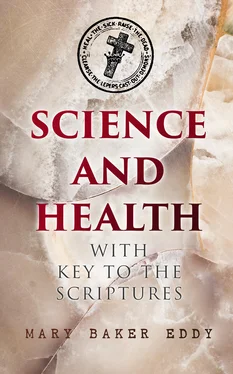Who is it that demands our obedience? He who, in the language of Scripture, “doeth according to His will, in the army of heaven and among the inhabitants of the earth; and none can stay His hand, or say unto Him What doest thou?”
A form or a person is not equal to this infinite Love and Wisdom. A finite or material sense of God leads to formalism and narrowness, freezing the heart of Christianity.
The theory of three persons in one God (that is, the Trinity or Triunity) suggests a heathen god rather than the one ever-present I AM. “Hear Israel, the Lord our God is one Lord.”
A limitless Mind cannot proceed from limits or personality. Finiteness cannot present the idea or person of infinity. A mind that originated from a finite source, or from a person, would be limited and finite. Infinite, impersonal Mind is the Creator, and creation is the infinite idea of His Mind.
That God is material, no man should affirm. The Bible represents Him as saying: “Thou canst not see My face; for there shall no man see Me, and live.” We know Him only as divine, as Life, Truth, and Love. Let us then obey and adore in proportion as we apprehend these qualities, and love Him understandingly, warring no more over a person, but rejoicing in the affluence of Deity. Then shall religion be of the heart, and not of the head. No longer shall theology be tyrannical and proscriptive from lack of love, — straining out gnats and swallowing camels.
The everlasting I AM is not bounded, or compressed within the narrow limits of physical humanity or mortal concepts. What the person of God may be is of small importance, when compared with the sublime question, What is Infinite Mind, or divine power?
If Mind is within and without all, then all is Mind; and this classification is scientific. If so-called matter is Substance, then Deity, matter's opposite, must be shadow; and shadow cannot produce Substance. From this it would follow that Spirit is not the Creator, and that matter is self-created. This heterodoxy ultimates in the belief in a bodily Soul and a material Mind.
A personal mind manifests all manner of error, and thus proves the material theory incorrect. Who hath found finite life or love sufficient to meet the demands of human want and woe, — stilling the desires, satisfying the aspirations? Infinite Mind cannot be in a finite form, or it would lose its infinite character as inexhaustible Love, eternal Life, omnipotent Truth.
It would require an infinite form to contain Infinite Mind. Personal man cannot be its image and likeness. A mortal, personal, or finite conception of God cannot embrace the glories of limitless, impersonal Life and Love. Hence the unsatisfied human craving for something better, higher, holier than this lower belief affords, and the insufficiency of that belief to supply the true idea.
The mythical theories of creation, adopted by mortal minds, are vague conceptions, affording no foundation for accurate views of the Immortal Mind, discerned apart from all bodily creations. Materiality cannot be made the basis of any true idea of God.
Mind creates its own likeness in idea, and this idea is very far from the supposed substance of non-intelligent matter. The Father of Mind is not the Father of matter. Personal sense would translate spiritual ideas into material beliefs, and say that person, instead of Principle, is the Father of the rain, “who hath begotten the drops of dew,” and bringeth “forth Mazaroth in his season,” and guideth “Arcturus with his sons.”
Mortal man has made a covenant with his eyes, to belittle Deity with human conceptions. Being in league with personal sense mortals take limited views of all things. Eye hath not seen Spirit, nor ear heard His voice.
With the microscope of Spirit you may discern the heart of humanity, and so comprehend the generic term man . Man is not distorted, for he reflects the Infinite; nor is he an isolated solitary thought, for he belongs to the sum of Infinite Mind.
God created all in the kingdom of Mind, when He expressed in man the infinite idea, forever developing itself, broadening and rising higher and higher from a boundless source. We know no more of man's personality, as the true divine image and likeness, than we know of God's.
The Infinite Principle is represented by the infinite idea, or man, and the senses have no cognizance of either; but human capacities are enlarged and perfected, in proportion as humanity gains the true conception of man and God.
Mortals have a very feeble and imperfect idea of the spiritual man, with an infinite range of thought. To him belongs eternal Life. Never born, and never dying, it is an impossibility for that man, under the government of Eternal Science, to fall from his high estate.
If man was once perfect, but has now lost his perfection, then mortals have never beheld in man the outlines or reality of the divine. The lost image is not man. Jesus understood this; and therefore said, “Be ye therefore perfect, even as your Father in heaven is perfect.”
To Jesus man was the true image of God. Christ's divine sense threw upon mortals the truer reflection of God. He lifted their lives higher than their poor models of thought would allow, — thoughts that presented man as fallen, sick, sinning, and dying. His understanding of scientific being and divine healing must include a perfect Principle and idea — perfect God and perfect man — as the basis of every thought.
Drawing our conclusions about man from an opposite standpoint, from imperfection instead of perfection, we can no more arrive at the true conception or understanding of man, and make ourselves like unto it, than the sculptor can perfect his outlines from an imperfect model, or the painter depict the form and face of Jesus by holding in thought the character of Judas. Truly is it written: —
Sculptors of men are we, as we stand,
With our lives uncarved before us,
Waiting the hour when, at God's command,
Our life-dream passes o'er us.
If we carve it then, on the yielding stone,
With many a sharp incision,
Its heavenly beauty shall be our own,
Our lives that perfect vision.
The conceptions of mortal, erring thought must give way to the ideal of all that is perfect and eternal. Mortals must change their ideals in order to improve their models. A sick body is evolved from sick thoughts. Evil, disease, and death arise from wrong vision. Sensualism evolves bad physical and moral conditions.
Images of mortal thought are transmitted through belief to the body. Immortal models — pure, perfect, and enduring — are transmitted through Science, which corrects error with the ideals of Truth, and demands right thoughts, to the end that they may produce harmonious results.
Through many generations children must be improved. and human thoughts attain diviner conceptions, before we can approach the immortal and perfect model of God's thought.
When mortals gain more correct views of God and man, multitudinous objects of creation, that before were invisible, will become visible. The crude creations of mortal thought must finally give place to the glorious forms that we sometimes behold in the camera of Mind, where the mental picture is more real.
The fading forms of matter are the fleeting thoughts of mortal mind, that have their day before the permanent perfection of Spirit shall appear. We shall behold and understand His creation, all the glories of earth and heaven and man, when we learn our way in Science, up to our spiritual origin.
When we realize that Life is Spirit, and never in or of matter, this understanding will expand into self-completeness, — finding all in God, and needing no other communion.
Scientific existence is the universe of Spirit, peopled with spiritual characters. Man is the offspring, not of the lowest, but the highest qualities of Mind. We shall understand spiritual existence, in proportion as our treasures are laid up in heaven. We gravitate Godward as our affections and aims grow spiritual, as we near the broader interpretations of being, and gain some proper sense of the Infinite.
Читать дальше












